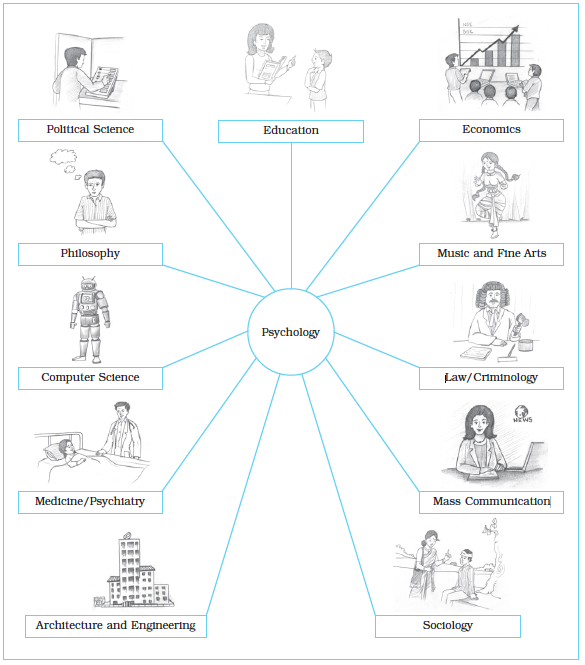Any discipline, that deals with people, would definitely recognise the relevance of the knowledge of psychology. Similarly, psychologists also acknowledge the relevance of other disciplines in understanding human behaviour. This trend has led to the emergence of an interdisciplinary approach in the field of psychology. Researchers and scholars in science, social science and humanities have felt the significance of psychology as a discipline.
Some of the major disciplines linked to the field of psychology are discussed below:
Philosophy:
Until the end of the 19th century, certain concerns that are now part of contemporary psychology, what is the nature of the mind or how humans come to know their motivations and emotions were the concerns of philosophers. In the later part of the 19th century, Wundt and other psychologists adopted an experimental approach to these questions and contemporary psychology emerged.
Medicine:
Doctors have realised that the maxim, a healthy body requires a healthy mind, is actually true. A large number of hospitals now employ psychologists. The role of psychologists in preventing people from engaging in health hazardous behaviours and in adhering to the prescribed doctors’ regimen are some of the important areas where the two disciplines have come together. While treating patients suffering from cancer, AIDS, and the physically challenged, or handling patients in the Intensive Care Unit, and patients during post-operative care doctors have also felt the need for psychological counselling. A successful doctor looks at the psychological as well as the physical well-being of the patients.
Economics, Political Science and Sociology:
As sister social science disciplines, these three have drawn considerably from psychology and have enriched it as well. Psychology has considered a great deal to the study of micro-level economic behaviour, particularly in understanding consumer behaviour, savings behaviour and in decision-making. Like economics, political science draws considerably from psychology, particularly, in understanding issues related to the exercise of power and authority, the nature of political conflicts and their resolutions, and voting behaviour. Sociology and psychology come together to explain and understand the behaviour of individuals within different socio-cultural contexts.
Computer Science:
From the very beginning, the effort of computer science has been in mimicking the human mind. One can see it in terms of how a ‘computer’ is structured, its memory organised, sequential and simultaneous (read parallel) processing of information.
Law and Criminology:
A skilled lawyer and a criminologist require knowledge of psychology in answering such questions as How well a witness remembers an accident, a street fighter, or a murder? How well can s/he report such facts when taking the witness stand in court? What factors influence the decision which is taken by the jury? What are the dependable signs of guilt and falsehood? What factors are held important in holding a culprit responsible for her/his action? What degree of punishment is considered just for a criminal act? Psychologists seek to answer these questions.
Mass Communication:
Print and electronic media have entered our lives in a very big way. They have a major influence on our thinking, attitudes and our emotions. If they have brought us closer together, they have also reduced cultural diversities. The impact of media on the formation of attitudes of children and their behaviour is a domain where both these disciplines come together.
Music and Fine Arts:
Music and psychology have converged in many areas. Scientists have made use of music to raise work performance. Music and emotions in other areas in which a number of studies have been carried out. Musicians in India have recently started experimenting with what they call ‘Music Therapy’. In this, they use different ‘Ragas’ for curing certain physical ailments. The efficacy of music therapy still remains to be proven.
Architecture and Engineering:
At first glance, the relationship between psychology and architecture and engineering would appear improbable. But such is actually not the case. ask any architect, s/he must satisfy her/his clients by providing mental and physical space through her design and satisfy aesthetically. Engineers must also take into account human habits in their plans for safety, for example, on streets and highways. Psychological knowledge helps in a big way in designing all mechanical devices and displays.
To sum up, psychology is located at the intersection of many fields of knowledge pertaining to human functioning.

